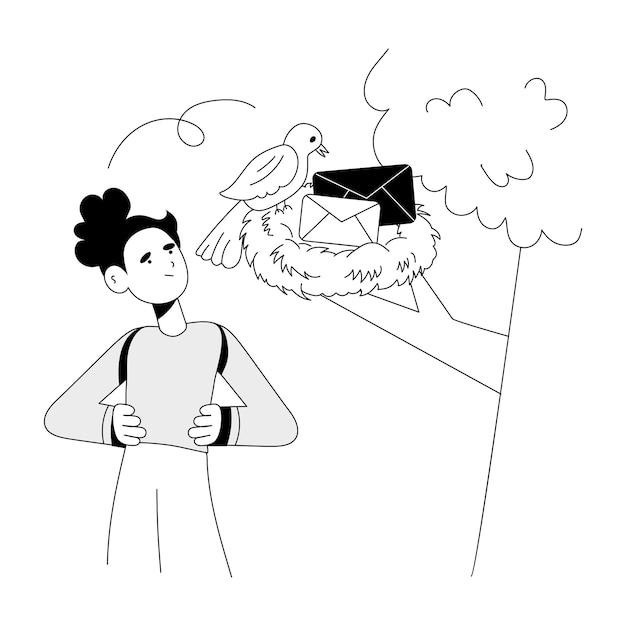Online dating has become incredibly popular in recent years, providing a convenient platform for people to meet and connect with potential partners. However, with the rise in online dating comes the increased risk of encountering catfishers, individuals who create fake online identities to deceive others. One platform that catfishers particularly gravitate towards is WhatsApp. But why do catfishers choose to use WhatsApp?
In this blog post, we will explore the reasons why catfishers prefer WhatsApp as a tool for their deceptive activities. We will delve into the dangers and risks associated with using WhatsApp for online dating, as well as provide guidance on how to spot and outsmart catfishers. So, if you’ve ever wondered why catfishers flock to WhatsApp or how to protect yourself from falling victim to their deceit, keep reading.

Why Catfishers are Hooked on WhatsApp
Catfishing has become a prevalent issue in the digital age, with the emergence of various social media platforms making it easier than ever for people to deceive others online. One platform that has gained notoriety in this regard is WhatsApp. So, why are catfishers drawn to WhatsApp like a fish to bait?
The Anonymity Advantage
One of the primary reasons catfishers prefer using WhatsApp is the level of anonymity it provides. Unlike other platforms where profiles can be easily tracked or reported, WhatsApp allows users to create accounts without the need for verified personal information. This anonymity gives catfishers a sense of security, allowing them to operate without fear of immediate consequences.
Fishing in a Global Pond
WhatsApp’s worldwide popularity is another factor that attracts catfishers. With over two billion active users in 180 countries, the platform offers a vast pool of potential victims. This global reach increases the chances of catfishers finding someone vulnerable or unsuspecting, making WhatsApp an ideal hunting ground for their deceptive practices.
Creating Catfish-friendly Camouflage
WhatsApp’s features and functionalities provide catfishers with ample tools to create and maintain their fictional personas effectively. The platform allows users to set profile pictures, status updates, and even share stories. These features enable catfishers to create compelling narratives, making it easier for them to lure unsuspecting victims into their carefully crafted webs of lies.
Reeling in Trust with Private Chats
The encrypted and private nature of WhatsApp chats provides catfishers with the perfect environment to establish trust with their targets. By engaging in one-on-one conversations, catfishers can manipulate emotions and build rapport, making their victims more susceptible to their deceitful intentions. The privacy WhatsApp offers gives catfishers the confidence to exploit their victims, knowing that their conversations are shielded from prying eyes.
Baiting with Multimedia Tricks
Another reason why catfishers gravitate towards WhatsApp is the ability to share multimedia content seamlessly. WhatsApp allows users to send photos, videos, voice recordings, and even documents. Catfishers use these capabilities to enhance their deception, sending alluring pictures or voice messages to add credibility to their false identities. The multimedia aspect not only aids in building trust but also serves as a powerful tool for manipulation.
Swimming with the School
Lastly, catfishers are more likely to use WhatsApp because they can blend in with the masses. As the platform is widely used by people of all walks of life, their presence is less likely to raise suspicion. By immersing themselves in the sea of legitimate users, catfishers can maintain a low profile and continue their deceitful activities undetected.
In conclusion, WhatsApp offers catfishers a breeding ground for their deceptive practices due to its anonymity, global reach, versatile features, privacy, multimedia capabilities, and the ability to blend in with other users. By understanding the allure of WhatsApp for catfishers, we can better protect ourselves from falling victim to their deceptive tactics in the vast digital ocean of the internet.

FAQ: Why do Catfishers Use WhatsApp
Welcome to our comprehensive FAQ section on the topic of catfishing on WhatsApp. In this section, we’ll address some of the most common questions and concerns that people have about catfishers and their use of WhatsApp. Whether you’ve been a victim of catfishing or you’re simply curious about this widespread phenomenon, you’ve come to the right place!
How Can You Spot a Love Scammer
It can be challenging to identify a love scammer, but there are some telltale signs to watch out for. Look for inconsistencies in their stories, a reluctance to video chat or meet in person, and a tendency to ask for money or personal information. Trust your instincts and don’t hesitate to cut off contact if something seems off. Remember, it’s better to be safe than sorry!
How Do You Outsmart a Catfish
Outwitting a catfish requires a mixture of skepticism and awareness. Do your research on the person you’re talking to, use reverse image searches to check their profile photos, and be cautious when sharing personal information. If something feels fishy, don’t be afraid to ask direct questions or confront them about your suspicions. And remember, never send money or disclose sensitive details to someone you’ve never met in person.
Can You Take Legal Action Against a Catfisher
While catfishing is morally wrong, it doesn’t always fall under clear-cut legal grounds. Each jurisdiction has different laws regarding online deception, so it’s best to consult with a legal professional to understand your options. In some cases, you may be able to pursue legal action if you’ve suffered financial or emotional damages as a result of catfishing.
How Do You Prove You’re Not a Catfish
Proving your identity to someone who suspects you’re a catfish can be challenging. One way to establish trust is by using video calls or arranging a face-to-face meeting. Additionally, you can provide social media profiles or other verifiable information that demonstrates your legitimacy. Transparency and consistent communication are key to dispelling any doubts about your identity.
How Do You Spot a Fake Profile
Spotting a fake profile requires a keen eye and attention to detail. Look for signs such as overly perfect photos, generic or vague descriptions, inconsistent information, and a lack of friends or social interactions on their profile. Trust your instincts, and if something feels off or too good to be true, it probably is!
Should I Share My Phone Number with Someone I Met Online
Exchanging phone numbers with someone you’ve met online can be a personal decision. However, exercise caution and consider the level of trust and rapport you have established. If you’re unsure, it’s best to hold off until you feel more comfortable and have verified their identity through video calls or other means.
How Do You Know if You’re Being Catfished on WhatsApp
Catfishing on WhatsApp can happen, but there are red flags to look out for. Be wary of individuals who avoid video calls, consistently cancel or postpone meetings, or bring up financial troubles. Additionally, be cautious if they refuse to share personal details about themselves or have a limited online presence. Trust your intuition and don’t ignore any gut feelings that something might be amiss.
What are the Dangers of WhatsApp
While WhatsApp is a widely used messaging app, it’s important to be aware of the potential dangers. These include privacy breaches, phishing attempts, identity theft, and, of course, catfishing. To protect yourself, ensure you have strong security settings, avoid sharing personal information with strangers, and be cautious when clicking on suspicious links or downloading files.
How Do Catfishers Find Online Dating Platforms
Catfishers are resourceful, and they often lurk on various online dating platforms searching for potential victims. They create fake profiles and exploit the anonymity provided by these platforms to deceive unsuspecting individuals. It’s essential to exercise caution and follow safety guidelines when engaging in online dating, regardless of the platform.
What Should You Say to a Catfisher
Engaging with a catfisher can be risky, but if you choose to confront them, be straightforward and assertive. Express your concerns about their deceptive behavior and explain that you’re ending all contact. However, keep in mind that some catfishers thrive on attention and may try to manipulate or guilt-trip you. It’s often best to cut off communication completely to protect yourself.
Why Do People Catfish
People catfish for various reasons. Some do it for personal amusement or to boost their self-esteem, while others have malicious intentions or are looking to scam unsuspecting individuals out of money. It’s important to remember that catfishing is a form of deception, and the motivations behind it can vary greatly from person to person.
Why Isn’t WhatsApp Considered Safe for Dating
While WhatsApp itself is a secure messaging app, it’s the users and their intentions that can make it unsafe for dating. Catfishers can exploit the anonymity and ease of communication on the platform to deceive and manipulate others. Always exercise caution and take necessary precautions when using WhatsApp or any other online platform for dating.
How Can You Determine if Someone You’re Talking to Online is Real
Determining if someone you’re talking to online is real requires careful observation and verifying their identity through various means. Ask for recent photos or engage in video calls to confirm their appearance matches their profile. Look for consistency in their stories and assess their online presence through social media profiles or other online platforms. Trust your instincts and don’t ignore any red flags that arise.
Why Do People Prefer Using WhatsApp
People gravitate towards using WhatsApp for a variety of reasons. It offers a convenient and efficient way to communicate globally, with features such as voice and video calls, group chats, and easy file sharing. Additionally, the platform’s end-to-end encryption provides a level of privacy and security that appeals to many users.
Is WhatsApp Safe for Dating
While WhatsApp can facilitate dating conversations, its safety depends on the individuals involved. Be cautious when sharing personal information, and remember that catfishers can exploit the platform. Practice vigilant skepticism, verify identities before becoming emotionally invested, and prioritize your safety above all else.
What are Three Signs That You’re Being Catfished
Three common signs that you may be falling victim to catfishing include a reluctance to video chat or meet in person, requests for money or personal information, and inconsistent or evasive behavior. If any of these warning signs manifest in your online interactions, it’s essential to proceed with caution or cut off contact completely.
How Can You Identify an Online Romance Scammer
Identifying an online romance scammer involves recognizing patterns and red flags. Look for individuals who quickly profess love or infatuation, ask for financial assistance or loans, or claim to be in desperate situations. Romance scammers often prey on vulnerable individuals, so maintain a healthy level of skepticism and protect your personal and financial well-being.
How Do Catfishers Search for Photos to Use on Their Fake Profiles
Catfishers utilize various methods to find photos for their fake profiles. They may search through stock photo websites, social media platforms, or even manipulate and customize images they find online. Reverse image searches can help uncover instances where photos have been misused or are associated with multiple accounts, aiding in the identification of a catfish.
Do Authorities Investigate Catfishing Cases
While catfishing can be emotionally devastating, it doesn’t always lead to serious legal consequences. Police and authorities tend to prioritize cases involving significant financial loss or threats to physical safety. However, if you believe you’ve encountered a particularly dangerous catfisher or have been the victim of a scam, it’s recommended to report the incident to your local authorities for further guidance.
Thank you for joining us for this comprehensive FAQ section on the topic of catfishers using WhatsApp. We hope it has provided valuable insights, helped raise awareness, and equipped you with knowledge to better protect yourself in the digital world. Stay vigilant, trust your instincts, and remember to prioritize your safety above all else!